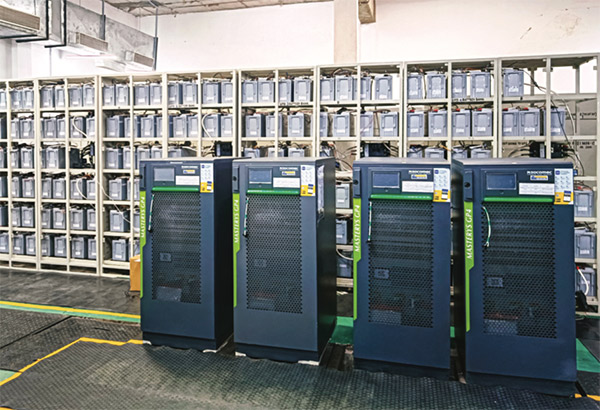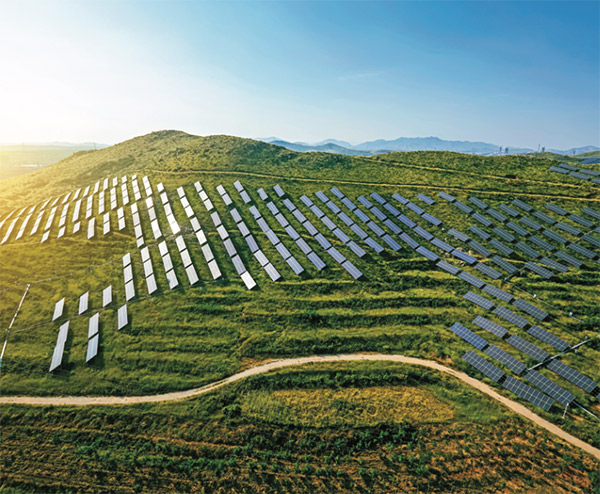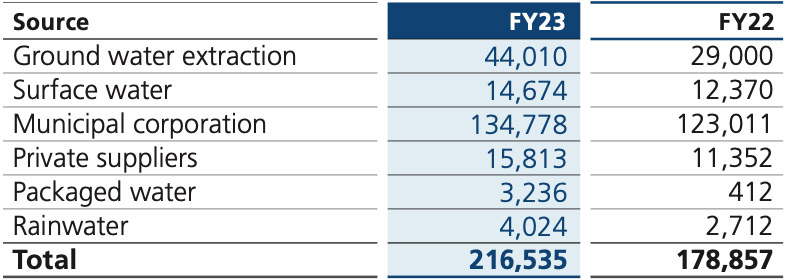
147,845 GJ
Energy consumption

52.07%
Renewable energy

216,535 KL
Water consumption

64.20%
Waste recycled
We take pride in our footprints of positive change, with which we are looking for ways to minimize the negative impact on the environment. We constantly identify key risks and take the necessary steps to mitigate them. At LTIMindtree, we remain committed to promoting sustainable practices that align with our values and vision for a better future.
Material issues addressed
- Green tech and innovation
- Climate change
- Water management
- Waste management
- Supply-chain sustainability
Key risks considered
- No risks identified
SDGs impacted


Energy conservation and emission management
Our organization is dedicated to promoting a sustainable future by implementing responsible and eco-friendly practices. We have incorporated into our business operations our commitment to the environment and society, ensuring sustainable growth. Our approach involves continuously monitoring, measuring, and controlling the environmental impact of our initiatives across all our facilities to minimize our ecological footprint.

Key initiatives
Enhanced LED lights have been installed at our Bengaluru West Campus and ESTPI campus to replace the existing T5 lights. This transition has resulted in a considerable reduction in lighting energy consumption. The initiative is expected to save 132,929.28 kWh of energy, with zero maintenance cost for five years. The overall cost savings, including the AMC for five years, energy savings, and buyback, is estimated to be INR 21.59 lakh per annum. The same initiative at ESTPI campus in Bangaluru resulted in a saving of 32,240 kWh of energy.
132,929.28 kWh
Energy saving for five years due to replacement of T5 lights with LED lights
At one of our Bengaluru Whitefield campuses, we have reduced the installed UPS capacity from 500 kVA to 320 kVA, which is 36% less than the original capacity. This decision was based on a thorough analysis of the load pattern over the past two years, including future projections. This reduction in capacity not only leads to energy and cost savings but also helps to minimize the need for replacements and associated expenses. The initiative is expected to save 1.27 lakh kWh of energy per annum, with a cost saving of INR 28.06 lakh per annum (including AMC, AC capacitor replacement, energy savings, and buyback), resulting in an ROI of 9 months. Similarly, at our Chennai DLF facility, we replaced the conventional uninterruptible power supply (UPS) with modular UPS to reduce the energy loss due to equipment inefficiency. The UPS capacity was reduced from 440 kVA to 380 kVA, which is 14% less than the original capacity. This initiative is expected to save 135,780 kWh of energy units per annum, with a cost saving of INR 15.75 lakh per annum.
The Indian government has made it compulsory to use Retrofit Emission Control Devices (RECD) for diesel generator (DG) sets with a capacity of 125 kVA or more. As a best practice, we have initiated the process of installing emission control devices for DGs in a phased manner. We analyzed various partners referred by the State Pollution Control Board (SPCB) in the market, as the Original Equipment Manufacturer (OEM) partner did not support the requirement, and finally identified a partner who met the set requirements by the SPCB.
At one of our Whitefield campuses in Bengaluru, we have installed RECD in a DG with a capacity of 500 kVA, resulting in 83% reduction in particulate matter and 87% reduction in carbon monoxide without causing any adverse effects on the Genset.
The emissions now meet the standard set by the authorities (i.e. less than 70%). To ensure the equipment's safety, the OEM partner will observe the condition for 6-9 months, after which we will install the device in the remaining DG sets.
At our facilities in Airoli, Hyderabad, Coimbatore, and Pune, we installed motion sensors to control lighting across the facility area without the need for manual intervention. The system automatically detects when a room is unoccupied and turns off the lights leading to significant energy savings over time. This initiative resulted in energy savings of ~71,402 kWh per annum with a cost saving of ~ INR 500,073.
The Airoli facility's server room has been equipped with AC units with a total capacity of 3TR, but these units are 10 years old and consume a significant amount of power while also experiencing frequent breakdowns. In order to reduce energy consumption, we have installed energy-efficient AC units, resulting in a 56% reduction in power usage, saving 10,368 kWh per year and INR 0.82 lakh per year. Additionally, the 10-year-old 43TR ductable AC units in the electronic private automatic branch exchange (EPABX) and multiplexer (MUX) room were replaced with 45TR inverter ductable AC units without interrupting the EPABX & MUX room's operations. This resulted in an energy savings of 94,003 kWh per year, with cost savings of INR 7.52 lakh and a Return on Investment (ROI) of 10 months.
94,003 kWh
Energy savings from replacement of old AC units
At the Whitefield Software Technology Parks of India (STPI) campus in Bengaluru, non-inverter AC units were replaced with high-performing inverter AC units for improved operations. This initiative resulted in energy savings of 25,600 kWh per year.
In the Chennai DLF facility, the Precision Air Conditioning (PAC) units in the data center and UPS room were over 10 years old and consumed a significant amount of power while experiencing frequent breakdowns. The ageing factor caused capacity loss of 9.53 TR and 5.58 TR for the data center and UPS room, respectively. To address this, high-performing PAC units with advanced technology were installed to improve operations, resulting in energy savings of 168,657 kWh per year. Additionally, the old AC units in the switch rooms were replaced with energy- efficient AC units, leading to energy savings of 282,072 kWh per year and recurring cost savings of INR 32.72 lakh per year.
282,072 kWh
Energy savings from replacement of old AC units with energy efficient AC units
By installing variable frequency drives (VFDs) for air-handling units (AHUs), we were able to achieve significant energy savings by allowing the Heating, Ventilation and Air-Conditioning (HVAC) motors to operate at required speeds based on the load requirement instead of constantly running at a fixed speed. This also helps to maintain indoor temperatures within the set range as per demand.
This initiative was implemented at various facilities and resulted in the following energy savings:
- At our Global SEZ facility in Bengaluru, we achieved an energy saving of 18,000 kWh per annum with a cost saving of INR 1.98 lakh per annum
- At Hyderabad Skyview facility, we achieved an energy saving of 15,500 kWh per annum
- At Whitefield STPI campus, we achieved an energy saving of 135,000 kWh per annum with a cost saving of INR 14.85 lakh per annum
In the Qubix Hinjewadi IT6 building in Pune, the electricity connection was registered in the builder's name, and the bills were based on sub-meter consumption. However, following a new guideline from the Maharashtra Electricity Regulatory Commission, LTIMindtree entered into a DF agreement, and direct metering and billing will be done in their name. As per the agreement, PF and harmonics will be monitored, and penalties will be levied for any deviations. To address the power factor and harmonics issues, we installed Automated Power Factor Correction (APFC) + Automatic Harmonic Filter (AHF) panels to prevent overloading of the electrical system. This initiative resulted in energy savings of approximately 15,000 kWh per annum, with a cost saving of around INR 2 lakh per annum.
15,000 kWh
Energy savings due to installation of APFC and AHF panels

Renewable energy
We have committed to making our operations run through 85%+ renewable energy by 2030. In the FY23, 52.07% of the electricity requirement for our India operations was met by renewable resources. We are constantly working with partners and governments in various states to increase our electricity requirement from renewable resources. We also provided electric vehicle (EV) charging stations in a few of our facilities to encourage employees to move toward EVs.



Water management
Preserving fresh water is a vital component of our corporate social responsibility (CSR), and we continually strive to reduce our impact on the community by adopting sustainable practices. To achieve this, we have integrated the reduce, reuse, and recycle (3R) approach into our operations to ensure minimal freshwater usage, and we have implemented various initiatives to achieve this goal. At most of our facilities, water required for flushing, landscaping, and Heating, Ventilation and Air-Conditioning (HVAC) cooling towers is sourced from recycled water. Moreover, in our Bengaluru facilities, we have initiated rainwater harvesting and installation of recharging pits to recharge the groundwater level. These efforts have helped us reduce private water purchases by a considerable amount in the current financial year.
We have also undertaken the following initiatives to reduce water consumption:
- Replaced existing water aerators with efficient ones in our Pune Hinjewadi and ICC Facility, which reduced the rate of water flow by 55% without compromising on user comfort. With full occupancy of the building, this initiative has the potential to save 3,894 KL per annum.
- Replaced conventional water-flush urinals with advanced waterless urinals in Pune, Hinjewadi facility. This initiative led to water savings of around 343 KL per annum, resulting in a cost saving of INR 140,000.


Waste management
Replacement of hand driers and removal of hand tissues
To promote sustainability in our workplace, we have been replacing all the old hand dryers with energy-efficient and high-speed hand dryers, which will help to reduce our environmental impact and eliminate the usage of hand tissue papers in all restrooms. The touch-free, high-speed hand dryers are designed to prevent cross-contamination and reduce the generation of contaminated waste. We have implemented this initiative in phases across our facilities, and it has been completed in our facilities in Bengaluru and Hyderabad. This initiative is expected to result in an energy saving of approximately 30,160 kWh units, a reduction of waste generation by approximately 20.23 MTPA, and a reduction in carbon emissions of approximately 3,447 tonne. Additionally, we can save approximately 345 trees per annum by eliminating the usage of tissues.
20.23 MT
Expected reduction in waste generation due to replacement of hand driers and tissue papers

Awards
National Safety Council of India and NSCI Safety Awards
Our Bengaluru West Campus has been awarded ‘PRASHANSA PATRA’ at the national level from NSCI Safety Awards in the Service sector
iNFHRA Workplace Excellence Awards
Our Bengaluru West Campus was recognized for its efficient energy conservation program and water saving, offsetting of overall organizational carbon footprint through various initiatives, and the Kolkata campus was recognized for Best Project Corporate
CII Energy Award
Our sustained efforts to minimize the environmental impact across our facilities resulted in Bengaluru West Campus earning recognition in the Excellence in Energy Efficient Unit category, while our Bengaluru East Campus and Chennai facility received accolades under the Energy Efficient Unit category
WSOINDIA (State Level) OHS&E Awards
Our continuous effort in improving the EHS measures across facilities resulted in Bengaluru East Campus won the Most Outstanding Performance, 5 Star Trophy under the category of Environment
